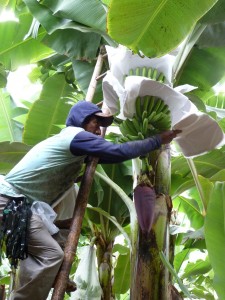Peru's banana farmers find power in numbers

When Luis Pacherrez Antón first joined the Piura Center for Small Organic Banana Grower Associations (CEPIBO), he worked in the organization’s warehouses in northern Peru.
Five years later, Pacherrez, the son of small-scale banana growers himself, serves as CEPIBO’s general manager.
Through a member-driven and cooperative-style system, the organization seeks to empower farmers much like the Pacherrez family.
“We work with 800 small producers who have under half a hectare, maybe one maximum. The majority have under half a hectare. So our work is socially based work, to provide for these 800 people,” Pacherrez told www.freshfruitportal.com.
“The most important thing is the confidence that CEPIBO has built with producers. Producers identify with CEPIBO. … Then comes the social side. CEPIBO also identifies with the producers. It works with the producers, for the benefit of the community.”
Twelve associations involved in organic and fair trade banana production fall under CEPIBO’s umbrella. Here, producers find an outlet to voice opinions and explore business options.
While CEPIBO works through a broker to supply major exporters like Chiquita, the organization also considers itself a direct competitor of traditional banana distributors.
Pacherrez says the NGO model is what makes the difference for producers.
“Producers feels like they are a part of the business. … They form part of the decisions that we make inside of CEPIBO. That makes the social side more attractive for producers. Each one has their representative inside CEPIBO,” Pacherrez said.
Members are also given a vote in CEPIBO’s general assembly, where contract terms are defined. For producers who depend on bananas for their livelihood, having a voice in contract negotiations can mean a world of difference.
“There’s only bananas. There is no other business,” Pacherrez said.
With the earnings made through CEPIBO’s model, Pacherrez said more farmers have been able to access healthcare and send their children to school in town.
The model also provides access to a different type of buyer like Equal Exchange, a U.S.-based company that sources fruit from cooperative producer organizations.
Pacherrez describes Equal Exchange as a strategic alliance for CEPIBO and as one of the group’s best clients in the United States.
Equal Exchange banana coordinator Jessica Jones-Hughes said interest in Peru’s organic produce began to gain momentum about eight years ago. The dry climate lends itself to organic production, while land policy lends itself to a cooperative system.
Although Peru still produces far fewer bananas that neighbors like Ecuador and Brazil, each averaging more than 7 million metric tons(MT) a year, Peruvian production has steadily grown.
The UN Food and Agriculture Organization estimates Peru produced just over 239,000MT of bananas in 2003, more than 300% greater than production just three years earlier.
“There are a lot of small producers in close proximity to each other that allow for, in bananas, a plantation-style model where you can have the efficiencies of putting in cable systems and putting in packhouses in centralized locations, but it’s all owned by small-scale producers,” Jones-Hughes told www.freshfruitportal.com.
Jones-Hughes praised the cooperative model for its ability to place power in the hands of producers, and for the larger community benefits that come with job creation and greater economic independence.
Through training efforts with U.S. produce departments, Jones-Hughes emphasizes the human element behind bananas. As U.S. consumers become more interested in local and fair food, Jones-Hughes hopes to shine a light on imported foods.
“These farmers have the same challenges; they’re just half-way around the globe,” she said.
While CEPIBO’s model stands out in Peru, Pacherrez said interest and business are growing, both locally and internationally.
“With CEPIBO, there’s a commitment to the interests of small producers. That’s what keeps us strong,” he said.
Photos: courtesy of Equal Exchange














































